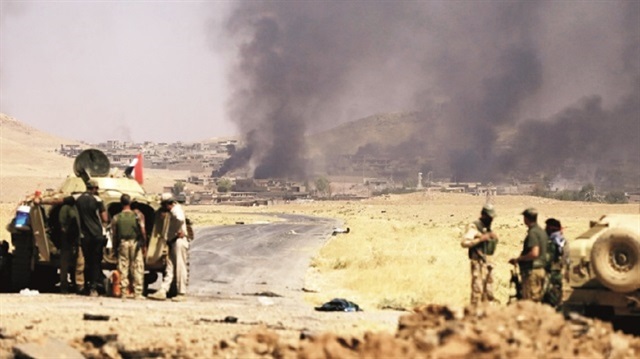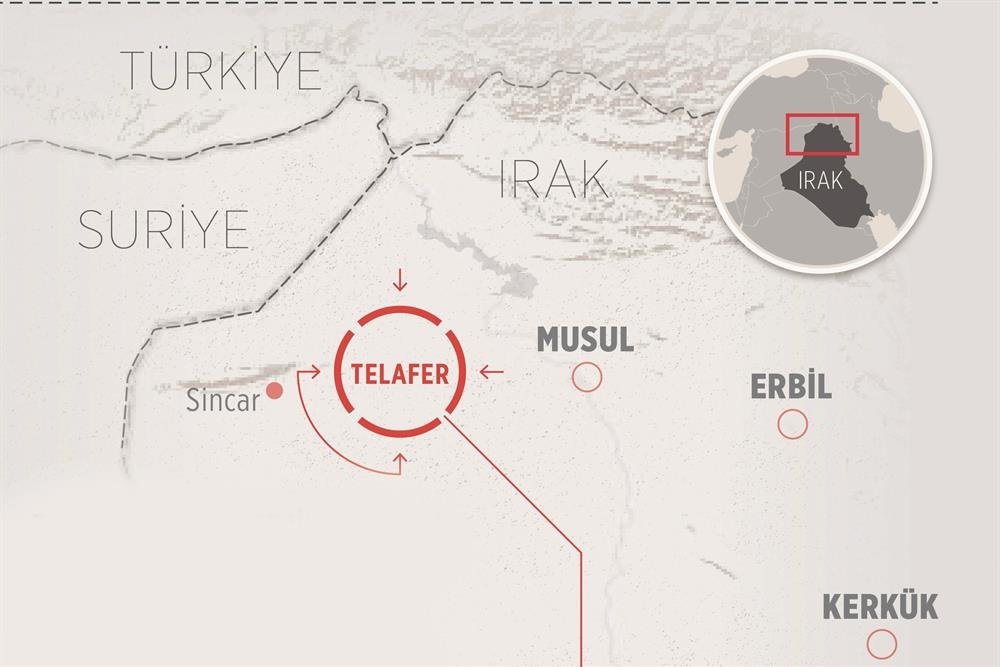
If the U.S. is successful in establishing such a corridor, it will achieve its goal in setting up a secure route that enables it to send all sorts of logistical supplies from Erbil airport to its terrorist allies in Syria
As the American and English-backed anti-Daesh operation in the Turkmen stronghold of Tal Afar reaches its end, the U.S. attempts to embed its partners from the terrorist Kurdistan Workers’ Party (PKK) organization as it sets up plans to rule the city and establish a terror corridor that completely connects Iraq and Syria.
Tal Afar, its population being comprised mostly of Turkmens, carries critical strategic importance as a terror corridor that stretches across Erbil- Tal Afar- Sinjar- Hasakah- Raqqa is planned to be established.
If the U.S. is successful in establishing such a corridor, it will achieve its goal in setting up a secure route that enables it to send all sorts of logistical supplies from Erbil airport to its terrorist allies in Syria.
The population of Tal Afar, which is a Turkmen heartland and a rural Mosul city, is made up of 75 percent of Sunnis and 25 percent of Shiites, and is located 60 kilometers to the west of Mosul.
With the Daesh presence in the city, it is said that the citizens of Tal Afar have deserted the city with only about 500,000 people remaining.
After it was cut off from the territories of the Ottoman empire, Tal Afar has stood up to the English occupation in 1920 and again during the American invasion of Iraq in 2003, when Turkmens of Tal Afar prevented the U.S. army and Peshmerga forces from entering the city.

As the U.S. and the Iraqi administration enter the previously impenetrable city, it is thought that retaliation plans are being prepared. The biggest concern today is that Tal Afar will suffer the fate of Mosul, Hasakah, Hama, Homs and Idlib. Plans to expel Turkmens from Tal Afar are deemed to be inescapable, as they’re being devised with the support of an anti-Sunni group such as the Hashd al-Shaabi militias.
“The slaughter of Turkmen in Tal Afar has already begun today, whatever they have planned for Idlib, will also take place in Tal Afar. The goal is to eradicate Turkmen and Turkey’s kin. We have already watched that happen in Aleppo, we’re witnessing that happening now in Idlib. It is a pity that the same is happening in the Turkmen city of Tal Afar,’’ note security experts.
Security experts point that Turkey must, without delay, get in touch with Turkmen tribes and pay close attention to the developments in the area.
Sources also point that Turkey must get ahead of the plans drawn by PKK terrorists in cooperation with the Iraqi government as Ankara should accordingly keep in contact with Iran.
Amid all of these efforts, Turkey must also closely observe all of the PKK terrorists in the areas west of Sinjar to the east of Tal Afar, and stay on alert in the case of any activities in the region.
The PKK is listed as a terrorist organization by Turkey, the European Union and the United States.
The PKK has been conducting armed violence in the southeastern part of Turkey since 1984. More than 40,000 people, mostly civilians, have been killed in the three-decade long conflict.
As the Tal Afar operation grinds on, the U.S.’s presence has been notable throughout the campaign to seize control over the city. Iraq Turkmen Front head and KRG parliamentarian Aydın Maruf spoke of the role the U.S played in the Tal Afar operation, noting that it has established a base east of the city, where military consultant and artillery units are said to be stationed.
As was the case in Syria’s Manbij and Afrin, U.S. cooperation with the Iranian-backed Shiite militia of Hashd al-Shaabi has drawn attention. And yet again, security experts note that the U.S.’s participation in the operation point to its plans to establish a corridor. As was the case elsewhere, the U.S. has tried to insert its biggest partner, the PKK, into Tal Afar as it plans a similar campaign to the one that was waged in Sinjar where the U.S. teamed with PKK terrorists and Peshmerga forces.
It has been pointed that among the goals the U.S. aims to achieve through the Tal Afar operation is the establishment of a strategic terror corridor. Accordingly, Tal Afar will fall midway along the route that connects Mosul and Sinjar, which is set to become a second Qandil.
In order to completely secure the Erbil- Tal Afar- Sinjar- Hasakah- Raqqa axis, seizing Tal Afar carries strategic importance for the U.S as it tries to complete the link between Syria and Iraq through the established terror corridor.
Establishing such a terror corridor would enable the U.S. to send reinforcements to Syria from Erbil airport through an uninterrupted route.
Hello, the comments you share on our site are a valuable resource for other users. Please respect other users and different opinions. Do not use rude, offensive, derogatory, or discriminatory language.
The floor is all yours.












